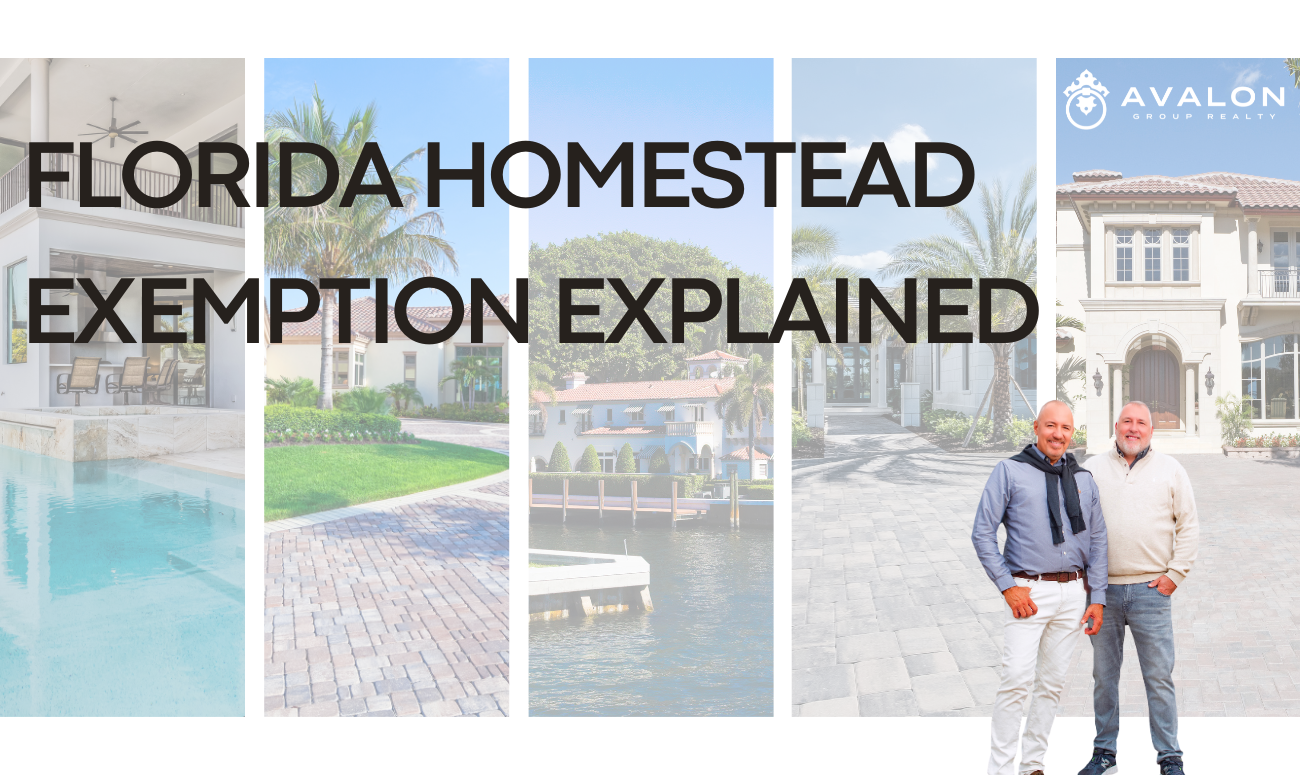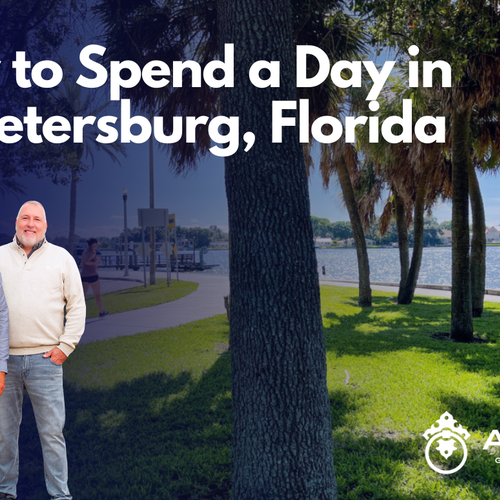Florida Homestead Exemption Explained
If you’re a Florida homeowner, understanding the Florida Homestead Exemption is essential. This provision not only offers significant property tax savings but also provides financial security. In this comprehensive guide, we’ll explain the benefits, eligibility requirements, and nuances of this exemption. Whether you’re a first-time homebuyer or a long-time resident, this blog, from Rob Johnson, Realtor with Avalon Group Realty in St. Petersburg, FL, will clarify everything you need to know about the Florida Homestead Exemption.
What is the Florida Homestead Exemption?
The Florida Homestead Exemption reduces the taxable value of your primary residence, significantly lowering your property tax bill. Aaron Hunt, Broker of Avalon Group Realty, emphasizes, “The Florida Homestead Exemption is one of the most powerful tools for homeowners to save money and protect their most important asset—their home.”
The exemption provides up to $50,000 in value reduction:
- First $25,000: Applies to all property taxes, including school district taxes.
- Second $25,000: Applies to assessed value above $50,000, but excludes school taxes.
Moreover, the Save Our Homes (SOH) cap ensures that your assessed value cannot increase by more than 3% annually or the change in the Consumer Price Index (CPI), whichever is lower. This limitation offers additional financial stability.
Eligibility Requirements
To qualify for the Florida Homestead Exemption:
- The property must be your permanent residence as of January 1.
- You must file an application with your county property appraiser’s office by March 1.
- You must have legal or equitable title to the property.
Yvette Kim, Realtor with Avalon Group Realty, adds, “Meeting the eligibility requirements early ensures homeowners take full advantage of these tax savings. Don’t wait until the deadline to apply.”
Florida Homestead Exemption Explained: Portability
Homestead portability allows homeowners to transfer their Save Our Homes (SOH) benefit from one Florida property to another. This portability preserves your tax savings when moving to a new primary residence. The rules are as follows:
- You must establish a new homestead within three years of abandoning the old one.
- File a Transfer of Homestead Assessment Difference (Form DR-501T) with your new homestead application.
Pam Amante, another experienced Realtor with Avalon Group Realty, explains, “Portability makes moving less financially daunting for Florida homeowners. It’s a game-changer for anyone considering upgrading or downsizing.”
2020 Updates to Homestead Law
In 2020, Florida extended the timeframe for claiming portability from two years to three. Nora Sturgill, Realtor with Avalon Group Realty, highlights, “This extension gives homeowners more flexibility and peace of mind, especially during life transitions like job relocations or family changes.”
Example of Portability Calculation
Imagine Marvin sold his homestead on June 20, 2020. To transfer his SOH benefit to a new home, he must file the necessary paperwork before January 1, 2023. By doing so, he retains the tax advantages accumulated over years of ownership.
Florida Homestead Exemption Explained: Tax Savings in Action
Let’s break down an example of how the exemption works:
- Just Value: $300,000
- SOH Benefit: $40,000
- Assessed Value: $260,000
- Exemptions: $50,000
Calculating Taxes
- School Taxes: ($260,000 – $25,000) x 0.007 = $1,645
- Non-School Taxes: ($260,000 – $50,000) x 0.011 = $2,310
Total Taxes: $1,645 + $2,310 = $3,955
By utilizing the Florida Homestead Exemption, Marvin reduces his tax liability by thousands of dollars annually.
Additional Benefits for Seniors and Veterans
Florida’s Homestead Exemption also offers added benefits for seniors and veterans:
Seniors
Eligible seniors aged 65 or older with household incomes below $20,000 may qualify for additional exemptions. In 2021, this exemption was $31,000.
Veterans
Qualifying disabled veterans and their surviving spouses can receive additional property tax discounts. Recent laws even allow certain exemptions to transfer to surviving spouses.
Protecting Your Florida Homestead
The Florida Constitution provides robust protection for homestead properties against forced sale by creditors. This safeguard ensures that your primary residence remains secure, even in challenging financial times.
Exceptions include:
- Mortgages and equity loans
- Property taxes and IRS liens
- HOA dues and assessments
Aaron Hunt emphasizes, “Florida’s homestead laws provide unparalleled protection for homeowners. It’s a cornerstone of financial security in our state.”
Common Questions About the Florida Homestead Exemption
What happens if I miss the March 1 deadline?
You may still file for the exemption late, but penalties or reduced benefits could apply. Contact your local property appraiser’s office for guidance.
Can I have homestead exemptions in multiple states?
No, the Florida Homestead Exemption applies only to your primary residence.
How do I file for the exemption?
Visit your county property appraiser’s website or office. Required documents typically include proof of residence, such as a Florida driver’s license and utility bills.
Is the exemption transferable between spouses?
Yes, certain transfers between spouses do not trigger reassessment. Always consult with your property appraiser for specifics.
Florida Homestead Protection Rules: Essential Criteria for Qualifying
Florida offers a powerful homestead protection, which shields homeowners from forced sale under most legal judgments. However, this protection is not automatic—it requires meeting specific qualifications. Here are the fundamental rules you need to understand to take full advantage of Florida’s homestead protections.
1. Intent to Make the Home Your Primary Residence
To qualify for Florida homestead protection, the property must be intended as your permanent and primary residence. Importantly, this intention can be formed immediately upon moving in. There is no waiting period required. Once you decide that a property will be your primary home, you are eligible for homestead protection.
However, the law limits you to one homestead per person. This means that if you primarily reside in another state or country, you cannot claim Florida as your homestead, even if you maintain a secondary residence here. A second home or vacation property elsewhere is allowed as long as the Florida property remains your primary residence.
In addition, Florida homestead protection extends to various types of properties, including single-family homes, condominiums, co-ops, stationary houseboats, and even long-term leases, as long as these properties are your primary residence.
2. Physical Residency Requirement
For the homestead protection to apply, you must occupy the property. This means you need to move in with your principal belongings and use the home as your primary residence. While temporary absences for work, school, vacations, or other reasons are permissible, you must show intent to return to the property as your home.
It’s important to note that the protection applies only if you are living in the home before a judgment is recorded against you. If a judgment is filed before you have moved in with the intent to maintain the property as your primary residence, that judgment could become a lien on the property, jeopardizing its homestead protection.
3. Ownership or Beneficial Interest
To qualify for Florida homestead protection, you must either legally own the property or hold a beneficial interest in it. You must be listed as the titleholder, which can include ownership in your personal name or through a revocable living trust.
However, properties owned by corporations, LLCs, or irrevocable trusts do not qualify for homestead protection. This rule also applies even if you are the sole owner of the legal entity. Therefore, it’s important to ensure that you have the proper ownership structure if you intend to claim homestead protection.
4. Property Size and Location
The size and location of the property determine the extent of homestead protection. If your property is within city limits, it must not exceed one-half acre to qualify for homestead protection. For properties located outside municipal boundaries, the homestead protection extends to up to 160 acres of contiguous land.
This rule ensures that larger rural properties can also be eligible for homestead protection, which might be particularly valuable in rural areas of Florida.
Florida Homestead Exemption: Tax Benefits
In addition to asset protection, Florida offers a homestead exemption that provides significant property tax savings for eligible homeowners. The exemption reduces the assessed value of the home by $50,000, which lowers your property taxes.
Save Our Homes Benefit
The “Save Our Homes” benefit limits the increase in your property’s assessed value to a maximum of 3% annually, or the rate of inflation as measured by the Consumer Price Index (CPI), whichever is less. This is a crucial benefit for homeowners looking to minimize the impact of rising property taxes over time.
To qualify for this exemption, you must meet the following requirements:
- The property must be your primary residence.
- You must have owned and occupied the property as of January 1 of the year in which you seek the exemption.
- The property cannot be rented out for more than 30 days during the calendar year.
Applying for Homestead Exemption
To claim the homestead tax exemption, homeowners must file an application with the county property appraiser’s office. This filing should include proof of primary residence, such as a valid Florida driver’s license, a copy of the deed or tax bill, and vehicle registration. For those whose homes are held in trust, additional documentation, such as a certificate of trust, may be required.
The Florida Homestead Act: Historical Context
The Florida Homestead Act is grounded in the state’s constitutional protection of a person’s home from forced sale. This protection extends to both urban and rural properties, ensuring that no judgment creditor can seize more than one-half acre in a municipality or 160 acres outside of it, as long as the property is a primary residence.
This law traces its roots to the 19th century when the federal Homestead Act of 1862 offered land to citizens who would improve it. Florida’s own version of this protection ensures that homeowners can maintain their property without the risk of losing it due to debt, making Florida a particularly attractive state for homeowners seeking security in their real estate investments.
Joint Ownership of a Florida Homestead and Homestead Protection Risks
While joint ownership of a Florida homestead can be an effective estate planning tool, it can also jeopardize the homestead protection if one of the co-owners does not reside on the property. Florida’s homestead protection offers significant asset protection from creditors, but it only applies to those who meet specific requirements. When one of the co-owners is a non-resident, a judgment against them can lead to the placement of a lien on their interest in the property. This lien could ultimately force the sale of the home, even if the other co-owner is a permanent resident.
For example, if a married couple adds their child to the title of their homestead property for estate planning purposes, the child’s residence status becomes crucial. If the child does not live in the home, they are not eligible for homestead protection. In the event of a civil judgment against the child, a creditor could place a lien on the child’s portion of the home, potentially forcing a sale. This scenario could lead to the parents losing their home, as the proceeds from the sale would be divided between the creditor and the parents, who could lose ownership.
No Waiting Period for Florida Homestead Protection
One of the most beneficial aspects of Florida’s homestead law is that there is no waiting period to qualify for protection. As soon as a person occupies the property with the intent to make it their permanent residence, the homestead protection attaches. There are no forms to fill out or declarations to file with the court for asset protection purposes. While a “declaration of domicile” can be filed with the court to formalize residency status, it is not required for homestead protection. More important than any formal declaration are the facts showing intent to occupy the property permanently, such as using the address on a driver’s license or vehicle registration.
Protection of Proceeds from the Sale of a Florida Homestead
Florida residents may maintain homestead protection even after selling their property, as long as they can demonstrate an intent to reinvest the proceeds in another homestead. To ensure the protection of these funds, the debtor must actively look for a new home and keep the proceeds separate from other sources of money. Many choose to deposit the proceeds into a “homestead account” to preserve this exemption.
There is no fixed timeline for reinvesting homestead proceeds, but the Florida courts have generally found timeframes ranging from a few months to a couple of years reasonable, depending on the specific circumstances of the case. However, long delays of four years or more may not be seen as reasonable in some instances. Furthermore, transferring proceeds into other exempt assets, such as retirement accounts, could be seen as a fraudulent conveyance, which could lead to the loss of the homestead protection.
Fraudulent Conversions Under Florida Homestead Law
Florida’s homestead exemption provides significant protection, including shielding homesteads from fraudulent conversion claims. Florida residents can convert non-exempt assets into a homestead at any time, whether by purchasing a new home, improving their current home, or paying down their mortgage. This ability to protect assets applies even if the transfer was done to shield money from creditors.
However, there is a key exception. If the debtor acquired the money through fraud or deceit, and then used it to purchase or improve their homestead, a creditor may be able to enforce an equitable lien on the homestead property. This exception applies only in cases where fraudulent funds were invested in the property. If fraud is not involved, the debtor can protect their homestead from creditors under Florida law.
Additional Considerations in Florida Homestead Law
Martial Interests and Non-Owner Spouse Rights
A married individual in Florida can maintain a homestead even if their spouse is not on the deed. Florida law allows for separate homestead interests, meaning the non-owning spouse also retains rights to the property. A transfer of the homestead, however, requires the signature of the spouse, regardless of whether they are named on the deed. After the death of the property owner, the surviving spouse may hold a life estate interest, allowing them to remain in the property for the remainder of their life, even if they were not on the deed.
Protection for Properties Under Construction
Homestead protection does not apply to properties under construction or vacant land intended for future occupancy. Only properties that are actively occupied as a primary residence are eligible for homestead protection. A civil judgment placed on an under-construction property will remain in place even once the property becomes a primary residence, potentially complicating the process of obtaining homestead protection.
Homestead Protection in Bankruptcy
Florida’s homestead protection offers a safeguard for those filing bankruptcy, although it may not be available in all situations. In a bankruptcy case, the homestead exemption is limited to approximately $160,000 in equity, unless the debtor has occupied the property for a continuous 40-month period. Joint bankruptcy filers can protect up to $320,000 in equity. However, the transfer of funds into a homestead within ten years of filing for bankruptcy may be challenged as a fraudulent conveyance.
Avoiding Probate with a Lady Bird Deed
One of the most effective ways to avoid probate for a Florida homestead is through a “lady bird deed” (enhanced life estate deed). This deed allows the owner to retain full control of the property during their lifetime, with the remainder interest passing directly to designated beneficiaries after death, bypassing the probate process. This can be a simpler alternative to placing the property in a living trust.
Important Court Decisions and FAQs
- Havoco of America v. Hill (2001): Florida’s homestead exemption prevents creditors from reversing the conversion of non-exempt funds into a homestead, unless the funds were obtained through fraud or deceit.
- Cooke v. Uransky (1982): Non-U.S. citizens cannot claim homestead protection in Florida.
- Davis v. Davis (2003): A Florida resident can operate a commercial business on homestead property without losing homestead protection.
For more answers to questions about Florida’s homestead law and how it may affect your property, speak to a real estate attorney or qualified professional.
Conclusion
The Florida Homestead Exemption is a powerful tool for reducing property taxes and securing your home. As Rob Johnson, Realtor with Avalon Group Realty, I’m here to help you navigate the complexities of this process. Whether you’re buying, selling, or considering a move, our team at Avalon Group Realty is your trusted resource.
Aaron Hunt concludes, “At Avalon Group Realty, we’re committed to ensuring our clients maximize every benefit available to them. The Florida Homestead Exemption is just one example of how we empower homeowners.”
Contact Us Today
For more information, visit Avalon Group Realty’s website or call Aaron Hunt at (727) 123-4567. Stay connected with us on Facebook and Instagram.
Contact Avalon Group Realty
To explore Florida real estate or understand how homestead laws might impact your property, reach out to Aaron Hunt, Broker at Avalon Group Realty, for personalized guidance.
Contact Aaron Hunt directly to start your real estate success story:
Phone: 727-262-7920
Follow us for more Tampa Bay real estate tips, market updates, and insider information:
👥 Join Our Community:
Facebook: Avalon Group Tampa Bay
Instagram: Avalon Group Realtors
Twitter: Avalon Group Realty
LinkedIn: Aaron Hunt
TikTok: Avalon Group Realty
For further guidance and updates, visit www.AvalonGroupTampaBay.com.




